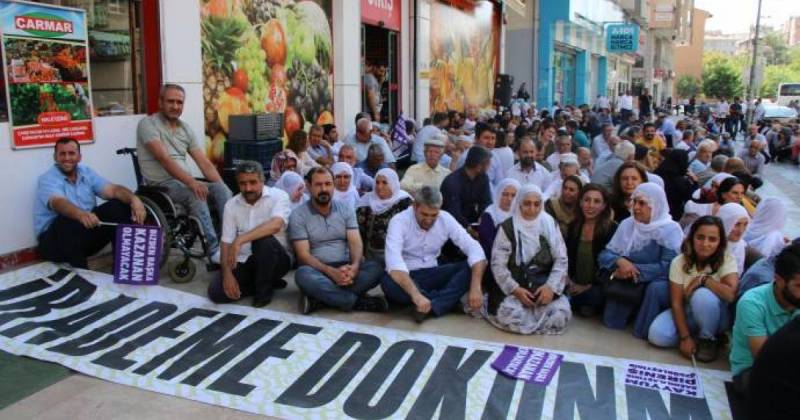A man sitting on the stairs in front of the market raises his left fist and tries to cry out, and the crowd in front of the market cheers him on. The deaf man tries with all his might to speak out about his opposition to the government appointees that took over municipal governments in several of Turkey’s Kurdish-majority cities this summer. A representative from the Peoples’ Democracy Party (HDP) comments, “If only everyone could speak out as well as he can.”
We are on Lise Avenue, across from the Diyarbakır city hall, participating in the protests against the government appointees.
The protests begin every morning around 11 a.m. They are flanked by barricades on both sides of the street, which is filled with police, tanks, and water cannons every morning.
People sit across from what is virtually a small army of police. A few hours pass with songs and slogans from the crowd – the chants are wonderful. Many people from western Turkey have come to show solidarity with the protests; I encounter visitors from the Human Rights Foundation of Turkey, the Turkish Medical Foundation, the Academics for Peace and others. Anyone who wants to can speak freely at the open podium that has been set up. The press statement delivered around 1 p.m. ends the protest for the day.
A crowd of between 100 and 200 people comes to these protests. Contrary to expectations, the size of the protests does not fluctuate. Although many of the attendees are from within the HDP, there are also lawyers, doctors, NGO-representatives, and members of the public. Members of parliament, party leaders, and the elected Diyarbakır mayor who was removed from office, Selçuk Mızraklı, join the protests every day.
It seems that the protests will continue for a while longer. There were additional plans to stage human chains in various parts of the city, but permission was denied for these demonstrations. There were also coordinated demonstrations in which locals turned their lights off and on at the same time at night, but they have been discontinued after being found to be ineffective.
During the protests, you can get up-to-date news on current events across the city. The main issue being discussed now is the families who say their children were taken to the mountains by the HDP to join Kurdish guerrillas. Another debated issue is whether the central government will also appoint administrations to take over district governments, and many expect more appointments to come.
Other issues at hand include the economic crisis, the curfew that is going into its fourth year in Diyarbakır’s central district, whether the HDP should pull out of Parliament, and the trial of jailed HDP former co-chair Selahattin Demirtaş.
As the city debates these topics, the government appointee who has taken over as mayor is reaching out to NGOs and businesses, inviting them to visit the municipal government. The goal is likely to share photographs of these visits and legitimize his administration.
Supporters of the governing Justice and Development Party (AKP) that appointed these administrations are also uncomfortable. One person I spoke to openly expressed this discomfort: “If people supported (the government appointees), they would have voted for them in the elections.”
The city is in chaos, dotted everywhere with police and protests, but the struggles of daily life continue amid the chaos, and the students are returning to school for the new year. But almost no one is making any plans for the future.
The long-term plans that are made tend to focus on leaving the region. People are exhausted from war and chaos. The 2015-2016 urban war fought between the Turkish government and Kurdish militants has brought people to a breaking point.
Seeing war and death at their doorsteps, the bombings, the destruction, the inability to sufficiently answer why all of this had to happen has created an emotional break. People are still trying to assert their will, but they are so very exhausted, and want to see good things for a change.
I talk to a young person who tells me, “I am tired. I want to see good things, to be like normal people my age. To go to the movies, to walk in a park, to fall in love, to live freely. But neither the government nor society allows this to happen. I am only 21 years old, but I am already exhausted.”
I speak to a doctor, who also intends to leave. “We have been resisting for years. But I realise now that productive people are not valued in this society. All they expect you to do is chant slogans. Everyone is angry. Rather than take their anger out on the state they attack each other. The state is, of course, a huge problem but I am sick of this society and this city as well.”
Two people sitting next to me at the protests speak up
“I think the crowd is very small,” says one.
“Considering all of the government pressure and arrests, I think this is a good crowd.
“They would drive their tanks over us in the 1990s, but tens of thousands would still go out to the streets to protest. This is not just a matter of government pressure. We have lost the hope that we used to have in the 1990s.”
Above these voices, the man whose name I learn to be Ferzende Maksut, who is known as “Lalo,” keeps his fist raised and yells with all his might in protest. The crowd responds with a clamour of applause.
© Ahval English
The views expressed in this column are the author’s and do not necessarily reflect those of Ahval.
